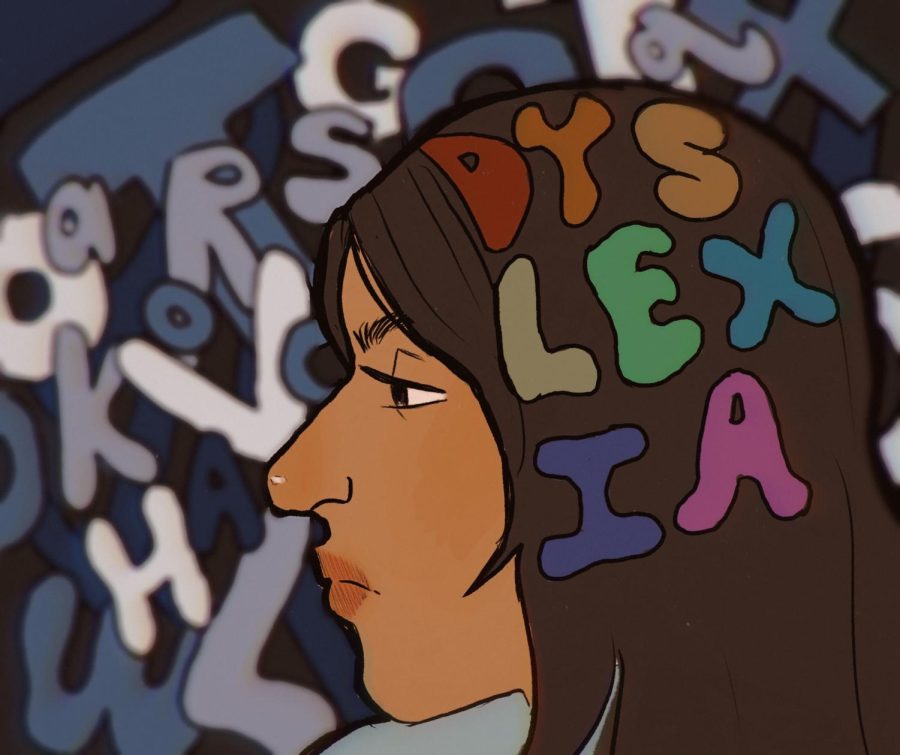Your donation will support the student journalists of Marquette High School. Your contribution will allow us to purchase equipment and cover our annual website hosting costs. You may become a PATRON by making a donation at one of these levels: White/$30, Green/$50, Blue/$100. Patron names will be published in the print newsmagazine, on the website and once per quarter on our social media accounts.
Media by Emma Tyulyayev
In 2015, the U.S. Congress recognized October as National Dyslexia Awareness Month. Senior Emma Hasler, who was diagnosed two years later, said she is glad it exists. “Dyslexia can definitely take a toll if you’re still in that phase where you’re embarrassed,” Hasler said. “That’s why awareness is so important. It shows that this isn’t abnormal or something to be ashamed of.”
October Marks National Dyslexia Awareness Month
November 1, 2022
Senior Emma Hasler was 12 years old when she noticed how difficult it was for her to read at the same pace and level as her classmates. It was then that she was diagnosed with dyslexia.
“I can’t read the fastest on tests and reading takes a bit longer, but I’ve grown used to it,” Hasler said.
The International Dyslexia Association defines dyslexia as “a neurologically-based condition that affects word-level reading accuracy, reading fluency and spelling. “
Hasler said that though it makes school more challenging, she has found ways to navigate it, especially in language arts classes. She uses tools such as Grammarly to help her write and Audible to help her read.
In 2015, the U.S. Congress recognized October as National dyslexia Awareness Month.
“Dyslexia can definitely take a toll if you’re still in that phase where you’re embarrassed,” Hasler said. “That’s why awareness is so important. It shows that this isn’t abnormal or something to be ashamed of.”
Hasler isn’t alone either. The Yale Center For Dyslexia & Creativity estimates that 1 in 5 Americans have dyslexia, representing 80-90 percent of all people with learning disabilities.
Micah Roeseler, senior, was diagnosed with dyslexia early on in elementary school. He said that while he has been able to improve his reading skills, some things remain challenging for him.
Some days my dyslexia is worse than others, but certain things do make it worse. In my Sci-Fi Literature class, we sometimes have to read out loud, and that usually worsens my dyslexia. So, that’s the most challenging thing for me.
— Micah Roeseler
“Some days my dyslexia is worse than others, but certain things do make it worse,” Roeseler said. “In my Sci-Fi Literature class, we sometimes have to read out loud, and that usually worsens my dyslexia. So, that’s the most challenging thing for me.”
Roeseler said he also utilizes Audible to overcome these challenges, and that he even enjoys reading now.
However, Roeseler said he doesn’t feel as though there are enough resources provided by MHS to help him.
He recounts being put into English classes in middle school with other students who had similar processing disabilities and that made him feel ostracized from the rest of the students. Though he is no longer in separate classes, Roeseler said he still doesn’t feel as though MHS is doing enough to support students with dyslexia.
“In elementary school there were SSD teachers that would come in and help students or they would be pulled out of class to work on reading skills,” Roeseler said. “But that has never happened in high school.”
Special Education Administrator Stacy Heuberger said that though students who have been identified as having dyslexia do not qualify for special education, there are resources available to them. She said teachers have undergone dyslexia training as required by Missouri’s Department of Secondary Education (DESE), which allows them to support different kinds of learning.
In everyone’s life—kids and adults—there has been a time in school where we didn’t get it. Students with dyslexia feel like they don’t get it every day.
— Stacy Heuberger
Heuberger said there is a stigma for students with dyslexia around asking for help, saying they don’t get something and appearing vulnerable in front of their peers.
“In everyone’s life—kids and adults—there has been a time in school where we didn’t get it. We were left feeling inferior or less than the other students in class because we assumed we were the only ones who didn’t understand when everyone else appeared to understand whatever was being taught,” Heuberger said. “Students with dyslexia feel like they don’t get it every day. Therefore, these students feel terrible about themselves, about their ability to learn, about their ability to be successful and it can negatively impact every facet of their well-being.”
Heuberger said though awareness months are a good way of dismantling stigmas, sharing information about topics such as dyslexia should not be contained to one month.
She suggests highlighting the roles of MHS’ related service providers (speech language therapists, occupational therapists, adaptive physical education teachers, music therapists, etc.), focusing on the relationships developing within MHS’ buddy programs in physical education, art, theater and cooking, highlighting 1-2 special education teachers, or identifying a specific disability area to research.
“MHS has so many great avenues of communication,” Heuberg said. “As with all important topics, the more knowledge and facts to which a community has access, the more progressive and supportive that community can be.”

